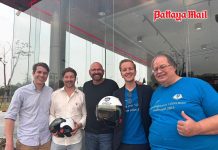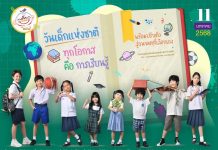‘Was it okay to quote my father?’ ‘How do I create references to sources within the text?’ ‘Is the layout of my article equivalent to what I would see in the newspaper?’ These were all questions that ran through my head towards the end of the second school term as I scrambled to finish my article for Amnesty International’s Young Journalist of the Year award.
It was quite a challenge to push myself to finish this article, since there is really no break when it comes to IB; doing optional assignments were no longer as easy to follow through with. But my efforts led me to achieve more than I could have imagined: to be awarded ‘Young Journalist of the Year’.
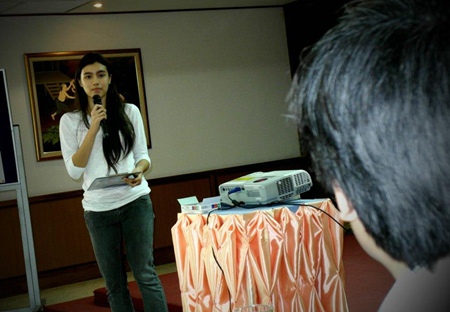 Mae gives her presentation.
Mae gives her presentation.
My article was about refugees and migrant workers in Thailand, specifically the human trafficking issue they are facing at this very moment. There are many online newspaper articles that will tell stories of men getting coaxed into the labor trade and ending up on fishing boats for years on end. As I said in my presentation, about half of one of Thailand’s largest international markets, the fishing industry, relies on labor provided by human traffickers. The worst part is that even the officials are said to be involved in the illicit trade. It disturbed me particularly because this topic was not being discussed among our local community. Before I wrote my article I had known very little about refugees being trafficked and enslaved in Thailand.
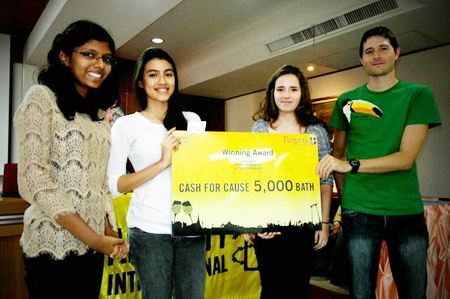 Mae (2nd left) with student competitors and Andrew Chambers (right) with the prize.
Mae (2nd left) with student competitors and Andrew Chambers (right) with the prize.
The rules of the competition were that our articles would be internally selected by our schools before being submitted. Then 20 winners would be selected by Amnesty International, and invited to attend a journalism and human rights workshop for one and a half days in Bangkok. When I heard I was one of the 20 shortlisted students, I was both shocked and amazed. But I immediately dove into my next obstacle, which was the two-minute presentation. We had one week to prepare, and our teachers played a big role in getting us informed and ready for the big day.
In Bangkok, our first workshop lasted two hours and took place at The Nation building in Bangna. Some of us were interviewed for the Thai PBS program, ‘English Breakfast’, before joining the rest of the group, who were in the journalism workshop. Here we were able to make friends with the other finalists, interview each other and learn a little bit about reporting and writing.
We then met again on Saturday to learn more about the human rights movement in Thailand. Truth be told, humans rights violations in Thailand are not a big concern among the government and the newspapers, but we are creating a starting point to get more people aware and concerned. Members of AI usually campaign about specific human rights issues and write letters to governments, political prisoners and other victims of human rights violations in an attempt to facilitate change.
Moreover, a columnist from The Nation newspaper spoke to us about the constraints of journalism and the traits that make a good journalist. He also told us about human rights violations in Thailand. We talked about freedom of speech, too, and whether newspapers try to be impartial or subjective. Then we had a lunch break, which many of us used to prepare for our presentations.
For the presentation we had split into two age groups: the under 14s and under 18s. The score we get from our presentation would make up 20% of our final mark, which is added to the score attained from our articles. Everybody in my group was confident about public speaking, but I think we were all nervous for each other anyway. Many stood at different corners of the room silently rehearsing their speeches just a few minutes before our presentations. When it was all over, we answered a few questions from the judges before moving onto one last workshop.
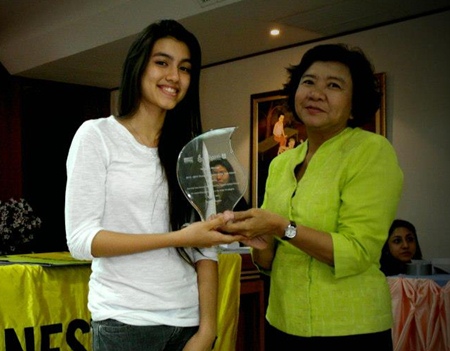 Mae receiving the award for the U18 category.
Mae receiving the award for the U18 category.
The last workshop was the most meaningful of all; we learnt about specific victims of human rights violations. There is one man in Taiwan, Chiou, who had been harassed, tortured and imprisoned by the police for a kidnapping and murder that he was accused of with little to no evidence. After 23 years of detention he has now been sentenced to death, but is not told of the date of his execution. Amnesty is fighting for this man’s freedom, as well as the abolishment of the death penalty, and so, for an activity, we created post cards for Chiou. In a video explaining his story, he had said that he liked getting pictures of different places he’s never seen, like the Taipei 101 skyscraper, and so many of us began drawing pictures of places for him, while others wrote letters to the Taiwanese government.
All in all, I feel like the experience and education I received over that weekend was invaluable and timeless. It could not be stressed enough how important it is to acknowledge human rights issues going on around us today and to be concerned about them. I think that, especially as our younger generation are less aware of what’s going on around the world, we should work together in identifying issues, spreading awareness about them in our own communities and doing something to help, whether it be campaigning, writing letters or even spreading the word among family and friends. That’s the first few steps to being a global citizen, and all it takes to become a human rights activist.


